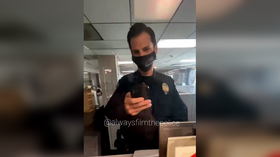Activist claims LA cops playing copyrighted music to keep videos of interactions with the public off social media

Police in Beverly Hills have been accused of playing copyrighted music while speaking to a local activist, in an apparent bid to trigger a content-blocking feature and keep videos of the encounters off social media.
Sennett Devermont is an entrepreneur whose ‘Mr. Checkpoint’ app tips users off to the location of police checkpoints on the road and allows them to rate their encounters with individual police officers. He’s also a thorn in the side of the Beverly Hills Police Department, and regularly livestreams videos of himself verbally challenging officers on the street and at protests.
Also on rt.com Protesters besiege police station as Rochester officers suspended for PEPPER SPRAYING 9yo girl (VIDEOS)In a video posted to one of his Instagram profiles on Tuesday, Devermont enters a police station in Beverly Hills to request a Freedom of Information Act form and begins pressing an officer, apparently Sergeant Billy Fair, on why he’s not wearing his “stripes,” and why he’s wearing a ‘Blue Lives Matter’ mask, as well as showing his viewers another officer’s phone number.As the encounter wears on, Fair seemingly tires of Devermont’s questioning, asks whether they can have “a normal conversation sometimes,” and begins playing Sublime’s ‘Santeria’ on his phone.
Realizing that the music could trigger Instagram’s copyright filters and have his video taken down, Devermont declares that “this is a form of stopping free speech.”
Instagram’s algorithms scan videos and live streams for copyrighted music and automatically delete them if any is detected. However, short samples of music are permitted, as long as recorded audio is not the “primary purpose of the video.” Should the algorithm miss a video, the copyright holder of the music can file a complaint.
The likelihood of Sublime siding with the police and lodging a complaint, however, is slim, given the ‘90s ska band’s enthusiasm for marijuana and rioting.
After the encounter, Devermont again approached Fair, this time at the scene of a crime. Fair again held out his phone, telling Devermont to “listen to the music.” Devermont described Fair’s conduct as “outrageous,” and told his 300,000 Instagram followers that he’d be filing a complaint against Fair and another officer, “Reyes.”
The Beverly Hills department told CBS2 that it is looking into these incidents, and does not condone its officers playing music on their phones while interacting with the public.
Also on rt.com NY attorney general sues NYPD for ‘excessive, brutal & unlawful’ treatment of George Floyd protestersWhile Fair’s encounters with Devermont were relatively benign, and remain accessible online, the use of copyrighted music could spell trouble for activists recording and publishing videos of actual police misconduct. Video footage of alleged police abuse was used last month to support a lawsuit against the New York police department, and a driver in Maryland captured a shocking police shooting on camera last week after goading the officer involved to shoot the suspect.
Filming police officers in public spaces is constitutionally protected in the United States. Some countries, however, don’t give citizens such leeway. French President Emmanuel Macron attempted to pass a bill prohibiting the filming of police officers on duty last year, but was forced to withdraw the legislation when massive protests erupted in response.
Think your friends would be interested? Share this story!















